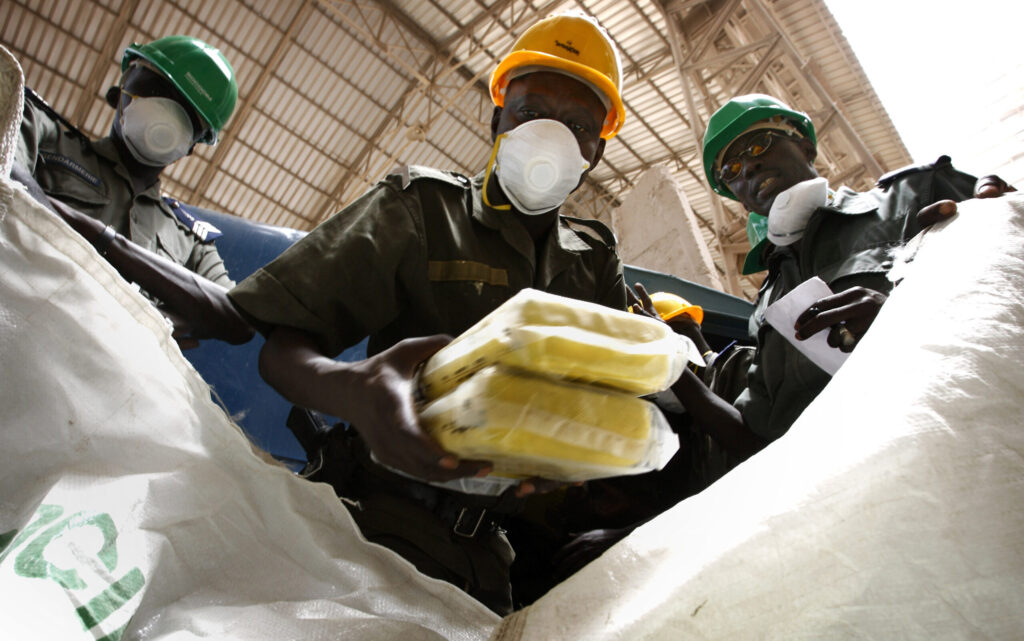By Prince Ahenkorah
A groundbreaking report by the Global Initiative Against Transnational Organized Crime has exposed a sharp decline in the cocaine trade within the Sahel region, with sneaky smuggling routes thrown into disarray by a wave of dramatic coups.
The eye-opening report shed light on the surge in trans-Saharan cocaine trafficking in the period between 2019 and 2023, with reports indicating a spike in the consumption of cocaine powder and crack across certain areas of the Sahel.
In a jaw-dropping revelation, seizures of cocaine in Niger, Burkina Faso, and Mali skyrocketed from a mere annual average of 13 kilograms between 2015 and 2020 to a staggering 1,466 kilograms in 2022.
The looming shadow of a continuous rise in trans-Sahelian trafficking raised security alarms, with well-known links between the cocaine trade and certain non-state armed groups, notably the disbanded Cadre Stratégique Permanent (CSP) operating in the region.
However, seismic changes in the Sahelian conflict and political sphere since 2023, along with turmoil in Libya in February 2025, appeared to have thwarted cocaine trafficking through northern Niger and partially northern Mali.
Meanwhile, reports of significant trafficking in southern Mali have surfaced, often being seen as a telltale sign of northbound flows.
The report underscored two primary factors behind the cocaine traffickers’ change in route, citing conflict and coups in the Sahel as game-changers.
“Two pivotal events in 2023 were instrumental in reshaping northbound cocaine trafficking flows towards Europe. Firstly, the July coup in Niger, causing a splinter in long-established ties between trafficking networks and state-sponsored actors. Secondly, the eruption of conflict in northern Mali in August 2023, pitting rebel groups against extremist elements from Jama’at Nasr al-Islam wal Muslimin (JNIM) and the Malian armed forces supported by Russia’s Wagner Group,” the report detailed.
As of the close of 2023, northern Mali witnessed unprecedented levels of violence, prompting many trafficking routes to veer away from regions mired in armed conflict and territorial upheaval.
In several occurrences, a shift within the broader trafficking corridor was observed. For instance, Tabankort, a key hub for logistical operations and storage of cocaine and cannabis resin migrating through northern Mali, apparently shifted its operations to In-Afarak, held under the sway of the Azawad Liberation Front, a conglomeration of separatist armed groups formed in December 2024.
On other fronts, routes diverted further, leading towards overland passageways via southern Algeria, southern Mali, Mauritania, or coastal nations, or onto aerial and seaborne routes.
The repositioning efforts have notably steered clear from the eastern reaches of Mali’s Kidal region, where the CSP relinquished control over pivotal trafficking nodes and the ability to shield drug convoys, heightening the risk of ambushes and throttling Niger-bound flows.
The aftermath of Niger’s July 2023 coup played a vital role in dismantling a long-held protection apparatus that previously shielded many traffickers, marking a sharp downturn in drug trafficking through northern Niger.
A former trafficker involved in moving substances through the Mauritanian desert and northern Mali reported crippling setbacks for networks in Niger, unable to rebound due to the skepticism towards the new regime.
A cascade of noteworthy traffickers closely linked to the ousted regime opted for a subdued presence, scaling down their operations.
Even though the shield network is anticipated to be reinstated gradually, the disruption in trade has been substantial, propelling some top players with ties to the previous administration to seek alternative revenue streams.
Recent reports suggest that Bidika has transitioned to the informal gold market in southern Algeria, a stark contrast to the fluidity seen in Mali.


